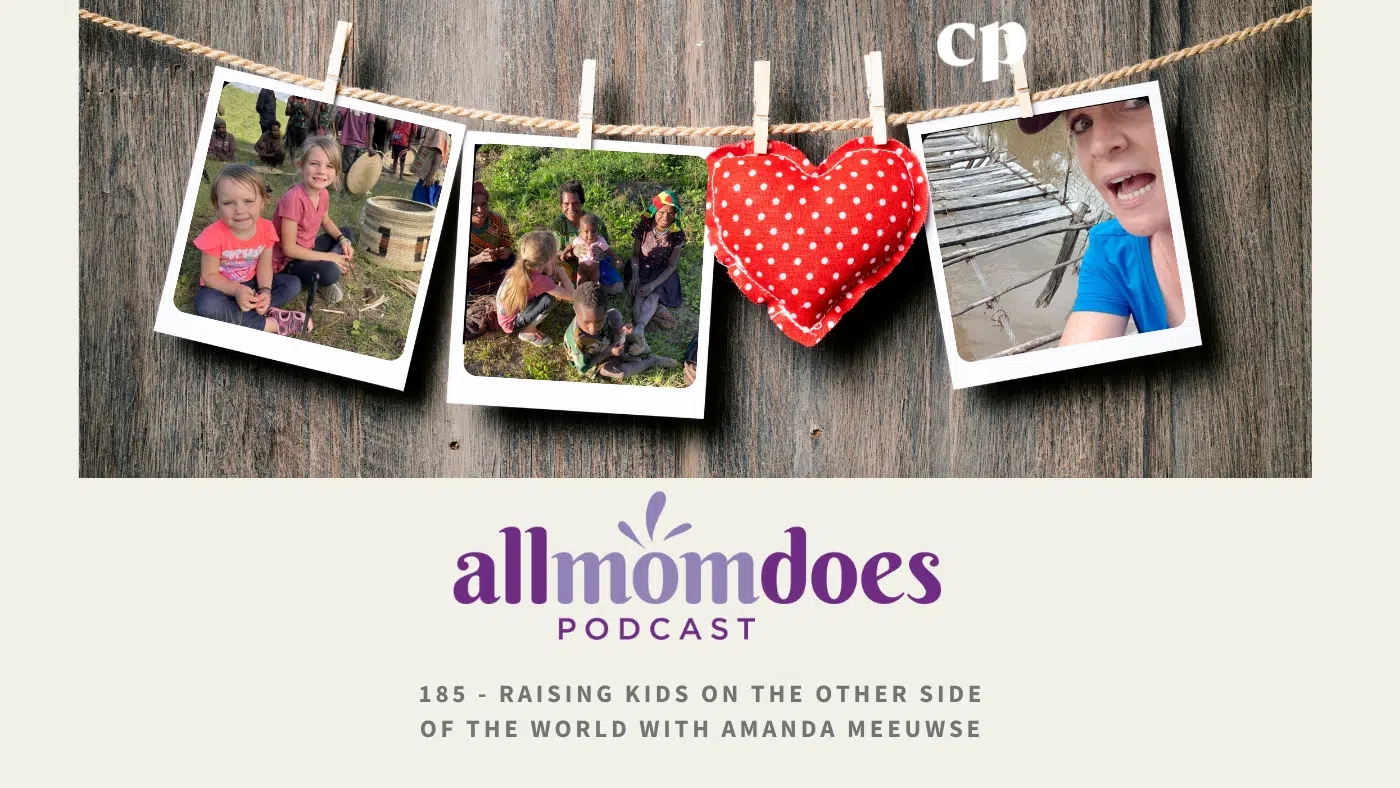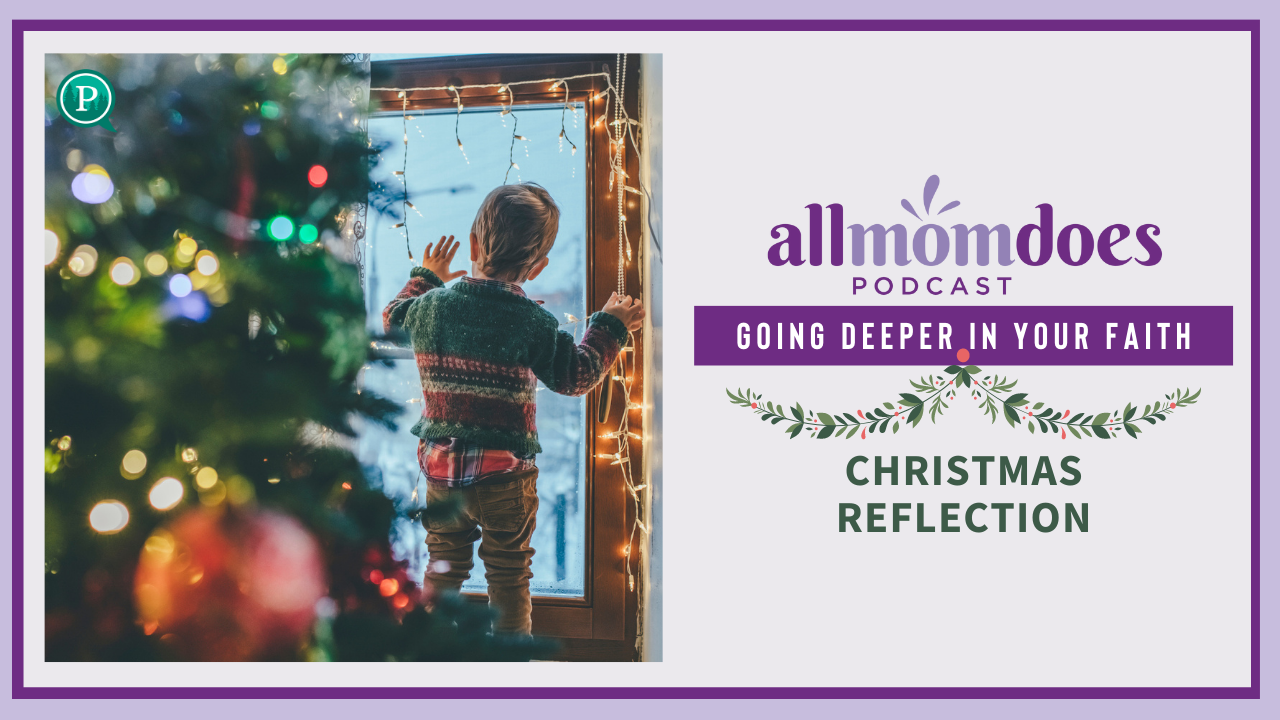As moms, there are lots of things that we worry about when it comes to our kids. But for most of us living in the western world, having access to medical care and other resources isn’t something we usual fret about. But for Amanda Meeuwse, raising her two daughters in a remote area of New Guinea means that she faces challenges and fears that a lot of us don’t consider. Amanda joins Julie Lyles Carr for a conversation about what it’s like to parent in conditions and settings that have big challenges.
Listen to “#185 – Raising Kids on the Other Side of the World with Amanda Meeuwse” on Spreaker.
Interview Links:
- Follow Amanda’s Story!
- Find out more about how you can support HeliMission.
Transcription:
Julie Lyles Carr: You’re listening to the allmomdoes podcast where you’ll find encouragement information and inspiration for the life you’re living, the kids you’re raising, the romance you’re loving, and the faith you’re growing. I’m your host, Julie Lyles Carr. Let’s jump into this week’s episode.
Parenting mothering is scary and it is unknown territory, no matter what, but when you actually think about being halfway around the world, from everything you’ve ever known in a country, you’ve not been to that you don’t necessarily have extended family in, all of these things… what is it like to parent in those circumstances?
My guest, Amanda Meeuwse is with me today to talk about just that, Amanda, thanks so much for being with me.
Amanda Meeuwse: Yes. Thank you so much for having me and hello from the future. I’m 14 hours ahead of you.
Julie Lyles Carr: trooper getting up in the absolute middle of the night. Okay. Early Dawn on your side of the world while it’s afternoon here in the states. So tell my listeners where we are getting to talk to you from where are you?
Amanda Meeuwse: So right now I’m talking to you from Indonesia. And a lot of people don’t know where Indonesia is. I get the question a lot. Oh, cool. So we are actually on the same island as Papa New Guinea. It’s a string of islands right above Australia. And we’re on the same island as Papa New Guinea. But we are on the half of the island that’s owned by Indonesia, and that’s called just Papua Indonesia.
Julie Lyles Carr: And how long have you been there?
Amanda Meeuwse: We have been here six years.
Julie Lyles Carr: Wow. So you’ve really spent some time and you have two daughters and you and your husband are originally from the Pacific Northwest.
So what took you to Indonesia? What was the thing that made you. Okay. We’re going to leave behind all the things that are familiar and extended family and all of that, and we’re going to head out on this amazing adventure. What was that?
Amanda Meeuwse: You know, I had a call to missions on my life since I was about 12 years old. I wrote in my Bible at a mission conference when I was 12 and growing up, I never, I never felt a direction and I never felt like God was pulling me in any certain direction, even though I prayed about it. So as I grew up, I put it on the back burner and almost forgot about it. Um, but then fast forward, all those years later, and on my very first date with my now husband, we had this whole conversation about missions and he was already signed up and on the way to this mission. And so from the very get-go of our relationship we knew that we would come here. So it’s just funny how God orchestrated all of that.
Julie Lyles Carr: So you were already ready for it. And I, I think that’s really important for people to note, because I think sometimes we can look at those who spend their lives doing missions work, and some of us can almost feel a little bit guilty like, oh man, is that a bigger expression of faith? Or is that something that I should aspire to? I love that, you know, that this was something that, that you knew you were supposed to do. Have you encountered people in the mission field that almost went out of a sense of guilt or thinking it was something they were supposed to do without really knowing if it was the call on their life.
Amanda Meeuwse: Yes, definitely. Um, and I’ve met a lot of women who come and they didn’t necessarily have felt like they have the call on their life, but they were, they were going, um, because it’s what their husband wanted to do or vice versa. So, yeah, I think it’s, um, but God can also meet you in that. So I’ve met women who it was, they were praying as they got married, that God change their husband’s heart about the mission field, but then they got to the mission field and God changed their heart and used it in their life. So you just have to keep surrendering to him.
Julie Lyles Carr: Unpack that for me, because you know, a lot of times we use phrases like feeling like you had a call on your life or feeling like God has asked you to do something and that can feel kind of nebulous. That can feel kind of vague. I mean, how did you know what that call was and how did, how did you really lean into it to say, okay, I really know that I know. In spite of things being, not necessarily having all the answers or a beat unclear where you would go or what that would all look like. How can people actually really listen for that?
Amanda Meeuwse: So I think God is so faithful because he put that call on my life a long time ago. And I knew from the moment I, my very first date with my husband, that this is where we were heading, but that doesn’t, that doesn’t mean that when it was time to start pulling up our roots and start leaving for the mission field that I didn’t throw a temper tantrum with God. I absolutely threw a temper tantrum with God we’d already had our first child. And I remember being just kind of upset about the whole thing and thinking, why do we have to go on the mission field and, and just kind of being mad at God? Like, why do you call us there? Why do you need us there? Can’t we stay here, but I have to tell you through a series, it was miracles.
Honestly, God met me right where I was at in the middle of my temper tantrum with him in the middle of me resisting the call that he’d placed on our lives. He sent a freak snow storm to keep me visiting my mom longer in another state, and I almost didn’t go to church that morning cause my daughter was fussy and I was cranky, but God, the holy spirit kept nudging me, go to church, go to church, go to the church you grew up in. And I went and that first, that Sunday was a mission Sunday and they had missionaries there speaking, up from, and they were talking about the very same mission that I was, that we were about to join. And God knew as soon as I went back from visiting my mom, I was going to have to start packing up my house. We were going to start the process of moving. And so I just he’s so, so faithful to meet us where we’re at. Even if we’re in the middle of a temper tantrum with him and I’ve heard this story played out into so many times by parents on the mission field where God had called them to something and they’re like, yes, yes, yes, but when the rubber meets the road, Our human reactions rise up and your, your mom instinct rises up and you’re like, whoa, whoa, whoa, throw the brakes on. This is scary. This is hard. This is unknown. And God is so patient and faithful and kind, and the holy spirit just kept nudging me and working in me.
Yeah, I think that’s why I say you have to just continue to be faithful through the hard times. You know, my father-in-law told me, right at the beginning of all of this, God is going to have you face giants, just like with David and Goliath. God could have taken out Goliath at any time, but he made David step out in faith. Ultimately God is the one that guided the stone and brought down the giant. And so I’ve constantly seen that on my walk here on the field, uh, on, on our journey here on the field as a family, and even when we were in the process of, of going on the field, we had to face giants. I had to face the giants in me, and I really feel like God, when God called us this mission at first, you think, well, we’re gonna go and we’re gonna, we’re going to bring change to this place. We’re gonna, we’re going to see that this place changed, but God brought me to this place and he for the first year was just changing me. Just using that place to change.
Julie Lyles Carr: Right, right. I love that, that important note that so often we can think we’re going into a situation where we’re going to be the ones bringing light and bringing wisdom and bringing all these things, and yet a lot of times you’re so right, there is a work that has to go on inside of us. There are things that we need to grow through.
There are things that we need to learn. So that’s really powerful that you bring that up. Now you’re engaged in a ministry model that is extremely unique and involves helicopters, and Amanda, I’ve got to be honest I had not heard of this when I first got your name and started getting to know you. I was like, what? So explain how missions and helicopters go together.
Amanda Meeuwse: Yeah, well, we live in a very rugged and remote area of the world. Um, it is so hard to explain it to the Western world, because unless you’re here, it just sounds so foreign. And our mission is called heli mission and it uses helicopters to be basically the wings of the gospel and bring help, bring the gospel into this very, very remote tribes, um, that could not be reached otherwise. That couldn’t be walked into. So there’s also an airplane ministry here that will go into places that have an airstrip, but the helicopter is reserved to go into the places that are more remote. So we’re talking about people groups here who only speaks their tribal tongue. They speak no other language. And there’s such a high concentration of tribal tongues here that one tribe won’t know the next tribes language. And these people have lived in animism for hundreds and hundreds of years. They don’t know anything about Jesus and they’ve lived in absolute fear and control from what they call the spirits to cut their fingers off as part of the mourning process. Oftentimes we’ll see women here with all of their, her fingers missing. It’s caused them to sacrifice babies. It’s caused them to just live in absolute fear. So these people live in grass huts. They have very little to no contact with the outside world. Um, they wear what we would see in our eyes as no clothes.
And it’s just a completely difference from our culture. And so the helicopter is used to support missionaries who go and live in these tribes for it can be up to 20 years and the missionaries learn their tribal language and we’ll translate the Bible into their tribal tribal language and teach them the gospel. And they have this whole systematic process of teaching them the gospel of Jesus. And it has been really exciting to see the change that Jesus makes. And so often people will say, why are you going? But my response to that is always come see for yourself. These people have lived in such fear and bondage from the spirits. And when, when you see Jesus, when you see them and they, they accept Jesus and they, they start to understand, you see that fear switch in them and they, and they don’t chop their fingers off anymore, and they don’t kill babies anymore. And they don’t have to not eat certain foods anymore. And they’re just there, they’re released of this fear.
So our goal is to support these missionaries living in these, these remote places. And, um, basically, yeah, the wings of the gospel, being able to get into these places. And, um, our goal is not to westernize them. Um, there’s so many parts of their culture that we just absolutely love. Um, the, our only goal is to hear about their savior, to hear about their Jesus who loves them so much. And so many times, and there’s a tribe being reached right now, as we speak. A new tribe being reached in about two months ago, they were presented with the gospel for the first time. And so there’s this whole new people group right now that is just, just hearing about Jesus. There’s the first believers in this tribe. There, I mean, you’ll never meet them on this earth, but you’ll be worshiping Jesus with them in heaven someday. And that church is just getting established. And they come weekly to hear what they call the creators talk and how he makes their path straight. And it’s amazing. It’s truly amazing. And then the other, the other, the other side of heli heli mission is to follow in Jesus’s example of not just meeting the spiritual needs, but meeting their physical needs as well.
As you can imagine, this is extremely remote. There’s no healthcare. So when people are sick, trouble and childbirth, um, they have nowhere to go. Um, for years they’ve leaned on their animistic rituals to try to recover their health. Heli mission will use the helicopter to medivac them out. So oftentimes they’ll, they can send a runner into a neighboring tribe that might have a sat phone, or if they’re able to send a runner into town, it can take days and days and days for that person to get in. Or, um, then heli, heli mission will be able to go and bring them to better care or bring a doctor into them.
Julie Lyles Carr: Wow. Those were things that, you know, in our Western world, we don’t really think about that often. Some of us who might’ve lived in smaller towns were like, well, you know, the, the nicer hospital was a town over, were things like that. But what if you were in a situation and particularly if you were in a situation with your kids where being able to get stitches on the proverbial, fall off the, off the tree and, you know, busting, open your elbow. What if that wasn’t right around the corner? So what is that like as a mom to realize that, yes, you’re bringing resources to these people, you’re bringing them the gospel, but by proxy, because you’re there, you’ve also to some degree, put yourself in some of the same situations that they’re in when it comes to not having access to a lot of the things we’re used to. And a lot of the things that give us comfort as moms that we, you know, would be able to respond to our child being sick or injured or, or whatever the thing is.
How have you navigated that, that mom heart versus that missionary heart?
Amanda Meeuwse: That’s a good question. And I’ve grappled with that many times, um, while we’ve been here. Um, you’re right. We have no, what we would consider in the Western world, we have no good medical care here, and we live in a town where you can only get in by airplane or helicopter. You know, you’re right. I, this place is much, much more raw than, than America. And there’s so many times that I have been presented with like a medical emergency with my children. And I’ve, I’ve thought instantly 911, there’s no 911. It’s just where my mind goes, you know?
And, um, So, I mean, there’s been times we’ve had an airplane on standby for my daughter a couple months ago and she fell and got a concussion. Um, and it throws you immediately back at the feet of Jesus. I mean, we’ve, I’ve had to learn as a mom that I cannot depend on anything, but Jesus. Of course, if there’s modern medicine, I believe God, you, we can use that too.
Right. Had from those comforts, there was a time a couple years ago when my youngest daughter got sick with dengue fever, which is quite serious. And we were medivaced to a couple of flight hour flight away to healthcare that we would still consider not to be great healthcare in our, in our eyes. And I remember taking a picture with her in the hospital and thinking, I think this will be the last, the last normal picture I ever have with my baby. And I remember that was a season of so much sickness. My other daughter had fever seizures, and we just were under constant sickness all the time. And, and I just remember side eyeing God and, and just looking at him with an altered view and saying, are you good?
Are you, are you, is this going to happen? Are you going to allow this to happen? That was a hard season for me. I want to read to you something that I wrote in my Bible from that time. Um, I have highlighted in my Bible right here in Psalm 18, and I have written next to it. Dengue fever. It says for it is you who light my lamp, the Lord, my God lightens my darkness for by you I can run against a troop and by my God, I can leap over a wall. This God, his way is perfect. The word of the Lord provides true. He is a shield for all those who take refuge in him. He made my feet like the feet of a deer and set me secure on the Heights. He trains my hands for war so that my arm can bend a bow of bronze.
You have given me the shield of your salvation and your right hand supported me and your gentleness made me great. That, those are the verses that God gave to me in that season. And God was so patient with me, even though again, I was lashing out at him and questioning everything about him that I knew to be true. He, he understands and he can handle those emotions. I wrote in my Bible then that, um, I’ve picked up my Bible after a long season of feeling dry and discouraged, but I feel his spirit drawing me quietly to read. We have just gotten home from Jakarta where Matt and Audrey and myself had dengue fever. It has been a hard season. It has been a year of sickness and I’m worn out. I felt far from God, even angry and defiant with him when dengue fever struck, but I reread these words and they are as true as ever. Even as we are still sick, and even as I took a picture with my sick baby, even though none of this has gone, as I prayed, Jesus,you are so good. You have not abandoned me. In you there is new joy and rest for my soul. I take refuge in you and like a helpless baby, let me crawl into your lap and allow you to hold me, trusting you fully. You may make me face war and you may make me pull back the arrow, and that is scary, but you are supporting me.
I don’t face this alone. Forgive my heart of stone. Forgive what came out of my heart when it was bumped. Use this season of sickness, this dengue fever to refine me. Don’t let this be wasted. Make me more like you. Help me to trust you in everything around me is making it hard to trust you. Give me endurance, give me purpose. So I think, um, sometimes we’re put in situations, even in the states where we have nowhere to turn except throw ourselves at the feet of Jesus. And I can say looking back that is the best place to be.
Julie Lyles Carr: How do you navigate? Because you know, we may have some listeners, some moms who are like, I would never put my kids in those situations.
Like, it, it feels, it feels reckless, you know, or it feels like, you know, you’re not stepping into that first ministry of being a mom. How do you navigate that because I do think there is a sense when we’re in the states that we are able to mitigate and control a lot of risk and yet, you know, we know that’s not always true. And yet at the same time, when you are talking about such a remote environment, an environment that doesn’t have some of the things that could make life a lot better, you know, for your kids, how do you handle what could be? I don’t even know that I want to say it’s criticism, but more of a sense from mom’s going, I don’t understand how can do that, um, and put their kids in that kind of scenario.
Amanda Meeuwse: Yeah, absolutely. That’s a good question. You know, I’m just looking here at the verse in Psalm 27: 14, and it just says be strong and let your heart take courage. Um, I would say to those moms or to anybody, you know, that God for sure has called us here. I believe God has called us here to touch our hearts and the hearts of my children. Just as much yeah he’s bringing us here to help spread his gospel to, to the ends of the earth. And we know that God has called my husband and I to this. And so for sure, we know that God has called our children to this. And I think that’s really important for my husband and I, um, that we include them in this. They’re not just being drug along as our children, but they’re part of this ministry. They know this God’s hand bringing us here. They know that they’re a part of this. And so we talk with them about that all the time.
And I think I would say to people, maybe you’re not called to this. God hasn’t called you and your family to this. And, and I think a lot of times, sometimes we can use, and I, I used this as an excuse before I came on the field, I think in the Western world, we kind of put missionaries up on a pedestal. Missionaries that go overseas and we say, okay, you look at you’re, you’re amazing. You’re so brave. You’re so strong. I could never do what you’re doing. In a way I can see how that’s true because you’re not called to what we’re doing. Maybe you’re not called to come see these big bugs in this weird food. And these people, groups that live in, in such remote places, and you’re not called to this, but you’re still called to the same mission. And if you’re a Jesus follower. And, and so wherever people are, um, they’re missionaries just like me. And so I think if God, God called you to be a missionary in, in America, He’s going to give you everything you need to be there. As where he’s given and your children, everything. They need to be there as where he’s given me and my family, everything we need to be here. And that includes my children because God’s promises don’t just stop with me and my husband. They go, they’re there for my children.
Julie Lyles Carr: Right. You know, I loved you talked about not that you’re there to try to westernize these people groups. That that is not the mission that you’re on, and I love that because there has been criticism of some of the missionary efforts in the past, where there has been this desire to almost bring Americanism to another part of the world and try to make that part of following Jesus and changing what people are doing, in terms of their lifestyle and the incredible backgrounds and histories that they have. What are you learning about parenting that you didn’t expect to learn from the people groups you’re serving? Because of course, I think you’re bringing this beautiful offering to these people that you are called to serve. And at the same time, I would have to guess that there are things you’re learning about the way that they conduct life. Some of the ancient wisdom that you get to see. Some of the family dynamics that you see that are teaching you something as well.
Amanda Meeuwse: Yes, absolutely. You know, we talked with a close friend here and we just asked them very honestly, we had a very honest conversation with them and said, can you please tell us the mistakes that we make as a Westerners. Things that are hard for you to swallow about us, because of our culture, things that we don’t even realize, and this is a close friend, they were very honest with us. And they said, you Westerners, or you don’t have time for people. And I thought, ouch. You know, I thought, well, I feel like I really try to invest in people, but you know, it’s true. We’re so goal oriented and we are so busy. We, we miss so much of life and here the P the, the culture here and the, the, the way the people are, it’s a much, much slower pace. And, you know, I, they’re just so much more people oriented and relationship oriented than we are. For example, I really had to get used to it here when friends will just stop by your house at any time of day without calling first and they’ll stay for a really long time.
And like that gives like, you’re in your Western thinking that gives you anxiety. Right? You’re like, I have things to do. I have deadlines to meet, you know? Um, and I had to get used to that say, okay, You can you have, okay, you have a friend here now, you didn’t plan this, but this is a cultural thing and you need to love them well. You don’t have to make it to the store. You don’t have to do what you were going to do. Just meet them where they’re at and, and enjoy them. And I think that is something that now I think about consciously, like slow down, slow down. Don’t miss out on so much of life. You’re so, you’re trained in your culture to just be so busy and goal oriented. And also the people here live really hard lives. Um, in the tribes, they don’t usually name their babies until their babies are about two years old because the infant death rate is so high. Something that I’ve had to look at myself about in my own culture is I can see, and it’s so easy to see things and other people’s culture, right?
Like the Bible says, seeing that speck in your neighbor’s eye. So, and that’s the same when you’re looking at different cultures, you know. I can see where Satan tries to come in and warp parenthood, warp motherhood in every culture. And I can see it, you know, they’re they’ve for years here killed one of the twins because they believe there’s an evil spirit in the second child. Um, now with the gospel coming in, that’s changing. Right. Um, there’s a story of, of, of a baby who was born to a mom and the husband was just convinced that this wasn’t his child, even though it was. So he ordered the mom to not, to not take care of the baby, to not feed the baby, to go put it in the jungle to die.
Missionaries lived in this tribe. They came in a couple hours later, caught wind of what happened and they talked with this man and told him about how, and this man was a new believer, he, he didn’t quite catch the Christ’s love for the baby and all that stuff yet. So he was a new believer and, um, they talked to him about how babies are a blessing, and God has blessed him with this child. And it doesn’t even matter the circumstance. It’s a gift from God. So that baby was saved. He went back and he’s accepted the child as his own. And, and so you just see how Satan has gotten in there and he wants to warp motherhood. He wants to warp it all in and I can see it in this culture. Right. And it’s made me go back and look at how is Satan trying to do that to me? How is Satan trying to do that to my, my family and my, my, my culture. And just to have a more proactive look at it so that we can be more proactive in battling those lights from Satan in motherhood.
Julie Lyles Carr: You are on such an incredible adventure. And yet I’m reminded again, that parenting, wherever you do, it is an incredible adventure.
It is a place where all of us just have to really lean hard on the Lord. And, you know, we can take comfort maybe in some of our Western accessories, our Western resources and yet parents across the world, struggle with similar things. Parents across the world, struggle with trying to understand and put together what is the best future for their families.
So your insights are absolutely incredible. And I love the humility that you bring to the table by saying I’m here to serve, but I’m also here to learn. So Amanda, where can people find out more about what you do in, in this amazing ministry and how can they be in touch with you?
Amanda Meeuwse: Yeah, we have a blog it’s helibladesoflove.blogspot.com. And also you can visit heli missions website at helimission.org. It’s a Swiss based ministry, but there’s an English option. Yeah, so that’s where you could connect and reach out to us if you wanted to learn more about what we do.
Julie Lyles Carr: We’ll get those in the show notes. And again, our amazing content coordinator, Rebecca puts those show notes together each and every week, so be sure and check those out. For more information on where you can see more about Amanda’s life and all the things that she’s doing, mothering on the other side of the globe in a very remote village and yet so much wisdom that applies to exactly where we are today in our Western culture as well.
Amanda, I can’t thank you enough for overcoming tech issues and time issues and all the things to be on the show today. I really appreciate.
Amanda Meeuwse: Yes. Thank you.
Julie Lyles Carr: Check out the show notes for all the links, info and other goodness from this week’s episode with a big thank you to our content coordinator, Rebecca. I’ve got to request, please go like and leave a review wherever you get your podcasts. It really does make a difference in helping other people find the show.
And I’ll see you next week here at the allmomdoes podcast.

















